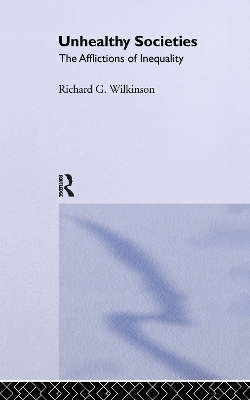
Unhealthy Societies
Routledge (Verlag)
978-0-415-09234-0 (ISBN)
Among the developed countries it is not the richest societies which have the best health, but those which have the smallest income differences between rich and poor. Inequality and relative poverty have absolute effects: they increase death rates. But why? How can smaller income differences raise average life expectancy?
Using examples from the USA, Britain, Japan and Eastern Europe, and bringing together evidence from the social and medical sciences, Unhealthy Socities provides the explanation. Healthy, egalitarian societies are more socially cohesive. They have a stronger community life and suffer fewer of the corrosive effects of inequality. As well as inequality weakening the social fabric, damaging health and increasing crime rates, Unhealthy Societies shows that social cohesion is crucial to the quality of life.
The contrast between the material success and social failure of modern societies marks an imbalance which needs attention. The relationship between health and equality suggests that important social needs will go unmet without a larger measure of social and distributive justice. This path-breaking book is essential reading for health psychologists, sociologists, welfare economists, social policy analysts and all those concerned with the future of developed societies.
Richard G. Wilkinson is Senior Research Fellow at The Trafford Centre for Medical Research, University of Sussex.
Chapter 1. Introduction The Health of Societies Chapter 2. Health becomes a social science Chapter 3. Rising life expectancy and the epidemiological transition Health Inequalities Within Societies Chapter 4. The problem of health inequalities Chapter 5. Income distribution and health, Social Cohesion and Social Conflict Chapter 6. A small town in the USA, war-time Britain, Eastern Europe and Japan Chapter 7. An anthropology of social cohesion Chapter 8. The symptoms of disintegration How Society Kills Chapter 9. The psycho-social causes of illness Chapter 10. Baboons, Civil Servants and children's height Redistribution, Economic Growth and the Quality of Life Chapter 11. Social capital: putting Humpty together again
| Erscheint lt. Verlag | 12.9.1996 |
|---|---|
| Verlagsort | London |
| Sprache | englisch |
| Maße | 138 x 216 mm |
| Gewicht | 453 g |
| Themenwelt | Sachbuch/Ratgeber ► Gesundheit / Leben / Psychologie |
| Medizin / Pharmazie ► Gesundheitswesen | |
| Studium ► 1. Studienabschnitt (Vorklinik) ► Med. Psychologie / Soziologie | |
| Studium ► Querschnittsbereiche ► Prävention / Gesundheitsförderung | |
| Sozialwissenschaften ► Pädagogik ► Sozialpädagogik | |
| Sozialwissenschaften ► Soziologie | |
| ISBN-10 | 0-415-09234-5 / 0415092345 |
| ISBN-13 | 978-0-415-09234-0 / 9780415092340 |
| Zustand | Neuware |
| Haben Sie eine Frage zum Produkt? |
aus dem Bereich


